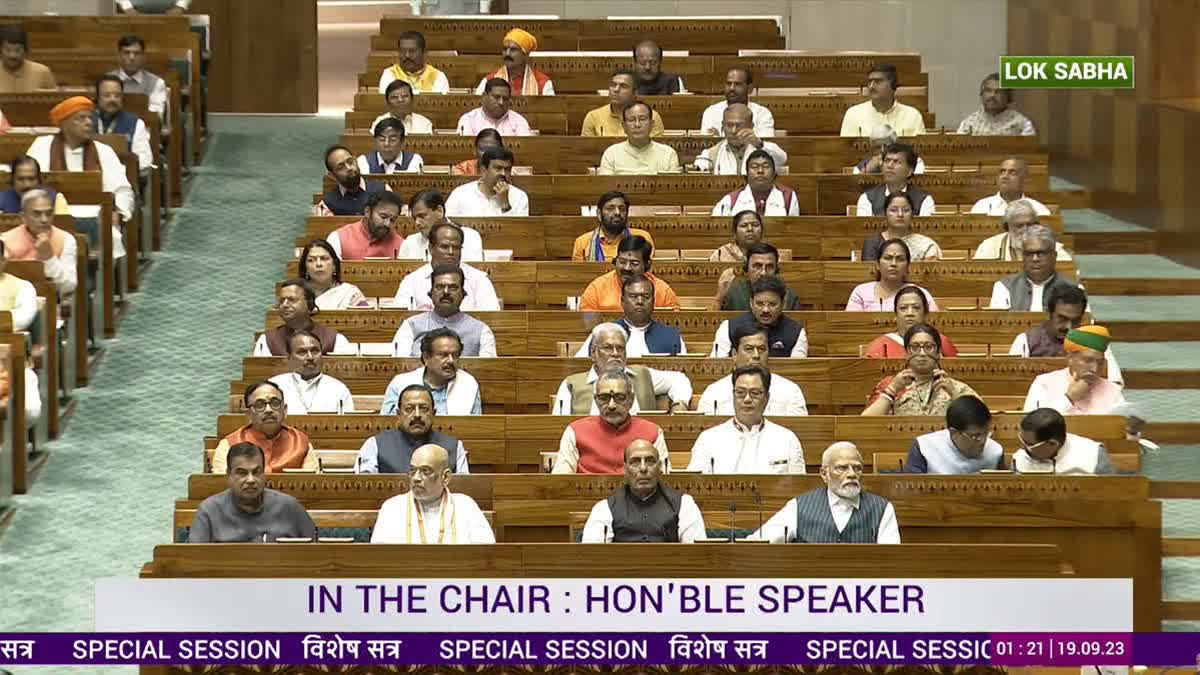Hyderabad: In the heart of rural India, Rikhuli Devi stands as a symbol of a paradox. Twice elected as the head of her Panchayat, she should represent the pinnacle of women's empowerment in grassroots politics. Yet, the reality is starkly different. Her husband, despite her electoral victories, effectively wields the power of the Sarpanch. Rikhuli's predicament reflects a persistent issue in the country despite nearly three decades of women's reservation in Panchayati Raj institutions: women representatives continue to be marginalized. The Women Reservation Bill, a topic of discussion for nearly a decade, is once again in the spotlight. However, it raises questions about whether this legislation will genuinely transform the political landscape or remain a mere token gesture in the fight against gender bias and patriarchal norms in politics.
The Bill's Impact
If the Women Reservation Bill is eventually passed, it won't take effect in the 2024 Lok Sabha elections. Nonetheless, when implemented, it will significantly increase the representation of women in the Parliament and Legislative Assemblies, aiming for a 33.33 percent quota. Presently, the Lok Sabha, comprising 543 MPs, would see the number of women MPs increase to 181. This increase is not limited to general seats; it extends to SC-ST women, who will also have a share in the reserved seats for Scheduled Castes and Scheduled Tribes. Currently, there are 84 reserved seats for SC and 47 for ST in the Lok Sabha. After the implementation of the women's reservation, 44 of these 131 seats will be reserved for SC-ST women. The remaining 362 seats will be open to both men and women. However, it's crucial to note that this law will only apply to Lok Sabha and state assemblies, while Rajya Sabha and Legislative Council will remain unaffected.
A Reflection on Political Parties
The debate on the Women Reservation Bill is not just about legislation but also a mirror reflecting the state of politics in India. Women's representation in politics has been stagnant despite the considerable progress women have made in various fields. India's political landscape remains male-dominated, and traditional patriarchal norms continue to influence decision-making. The introduction of one-third reservation for women in Panchayati Raj institutions in 1993 was a step forward, but the persistence of the "Sarpanch Pati" system demonstrates the gap between theory and practice. Many instances exist where women won elections but had little real authority. This disparity raises questions about the effectiveness of such a system.
Also read: 'Women want to be respected, not worshipped:' DMK’s Kanimozhi in Lok Sabha
Political parties in India have rarely taken a strong stance against this system, which has perpetuated gender inequality. The Women Reservation Bill represents a unique opportunity for political parties to advocate for gender parity in politics. Today, it seems that every political party has become a vocal supporter of women's empowerment, but the reality is quite different. In the 2019 Lok Sabha elections, only 14 percent of the total 543 seats were occupied by women, with 78 women MPs making it to Parliament. State assemblies present a similar picture, with women's representation often falling below 10 percent. Even when it reaches 15 percent, it's still a far cry from genuine gender balance.
The Nepotism Question
Nepotism in politics is an issue that political parties frequently accuse each other of, but it's a stain that transcends party lines. The question arises: Will women's reservation end nepotism in politics? Experts believe that the implementation of the Women Reservation Bill will lead to a redistribution of Lok Sabha and Assembly seats based on population, reservation roster, and delimitation. Consequently, it's possible that a seat may not be reserved for a woman in consecutive elections. This could, in theory, reduce the perpetuation of political dynasties. However, the onus will be on political parties to ensure that they genuinely support women's participation and do not merely substitute male candidates with female family members to comply with reservation requirements.
Is 15 Years of Reservation Enough?
Assuming the Women Reservation Bill becomes law and is implemented, women will benefit from reservation for the next 15 years. However, the question arises: Is 15 years of reservation sufficient for women? Dr. Sushil Trivedi, a former commissioner of Chhattisgarh State Election Commission and retired IAS officer, believes that it might not be feasible to abolish women's reservation as a concept. According to him, the bill is designed for a 15-year period, completing one-third reservation over three terms of five years each. After this period, it will be up to the Parliament to decide whether to extend the law, similar to the 10-year reconsideration process for reservation when the Constitution was originally established. Today, reservation has become an integral part of Indian politics and society, with no foreseeable end.
Conclusion
The Women Reservation Bill represents a significant step towards addressing gender inequality in Indian politics. If successfully implemented, it could pave the way for greater female participation and influence. However, it also raises questions about the genuine commitment of political parties to women's empowerment, the persistence of patriarchal norms, and the potential consequences for nepotism. Whether 15 years of reservation will be enough remains a topic of debate, but one thing is clear: The Women Reservation Bill is not just a piece of legislation; it is a reflection of the complex interplay between politics, gender, and societal norms in India. Its ultimate impact will depend on how effectively it is implemented and the collective will of the nation to embrace gender equality in the realm of politics.



